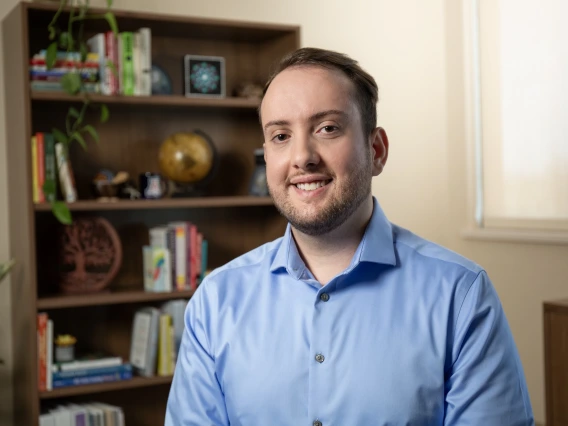
Majoring in German Studies not only brought Thomas Noth closer connections to his family, but like so many other humanities graduates, he found that exploring personal passions has yielded unexpected benefits throughout his professional life as well.
Noth, who graduated with a double major in German Studies and Psychology in 2018, and continued to earn a master’s degree in Counseling in 2020, is the College of Humanities 2024 Young Professional Achievement Award recipient.
Now a clinical supervisor for substance use services at MHC Healthcare in Marana, and founder and founder and primary therapist for BrighterView Counseling, LLC, Noth said that choosing the humanities made him a more well-rounded therapist and helped him connect with his patients better.
“When I look back at my experience with psychology, it was the degree that helped me get into my profession. German Studies was something on top of that and was a lot more fulfilling and meaningful, but it also added a lens to the world that maybe psychology by itself doesn't,” he said. “German Studies created an opportunity for me to really focus on that compassionate and empathetic side of health care.”
When he first started at the University of Arizona, Noth first took Spanish for his language requirement, before deciding to switch to German. Developing a more adult relationship with his grandparents made him more curious about their journeys as two immigrants from Germany who met at church in Buffalo.
“I was wanting to look through photo albums. I was wanting to look at old slideshows, learning about and getting connected with my family that currently lived in Germany,” he said. “I got to a tipping point where I wanted to be closer with that part of my family and honor and respect my grandparents and make sure that I understood what they had to go through to get here. It was special for me to learn their language and it opened my eyes to so much.”
Loving his German classes, Noth went beyond his initial plan for a minor and declared a double major. Learning as much as he could about German language and culture added another layer to his college experience, giving balance to his busy schedule of marching band, internships and psychology courses.
He remained focused on his career goals, but found he got there in a better way through German Studies, through the program’s personal touch, but also through honing his critical thinking skills and developing a more big-picture view about people’s experiences.
“I think humanities and health go together because without that human aspect, we're not able to really focus on treating the full person,” he said. “We want to be able to focus on an integrated care approach. If you're not really focused on the person and their background, their culture, their identity, the language that they speak, and how they interpret the care that you're trying to provide, it doesn't resonate as much.”
Now, as a therapist as well as a supervisor, he understands the significance that language, nationality and culture have on health disparities and how those elements must be considered in developing relationships with his patients.
“When I’m meeting with somebody one on one or in a group setting, I can do an assessment, I can diagnose, I can put all these labels and tags on people that are very big picture. But when you add that additional lens of more of that compassionate, empathetic side of health care, which I was able to gain an appreciation and understanding for through my humanities lens, it just allows me to be a much more well-rounded practitioner,” he said.

